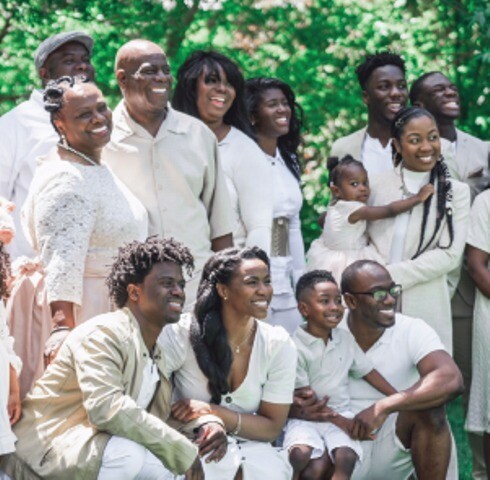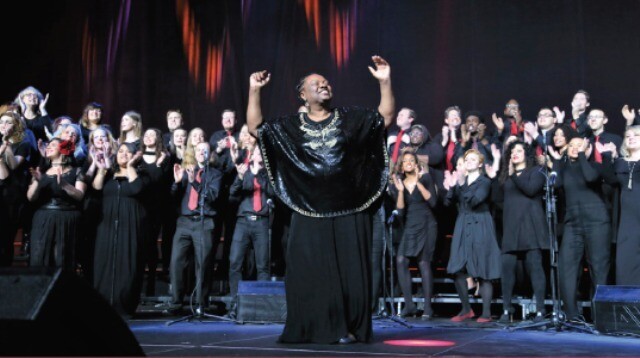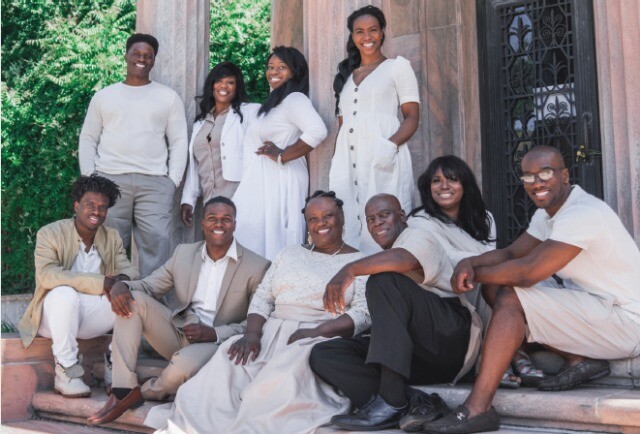Editor’s note: This article was originally published on LDSLiving.com in October 2018.
In 1981, Harry and Debra Bonner had two kids with another on the way and only $18 to their name when they found themselves sitting in a Las Vegas casino, trying their best to stay awake. If they started to fall asleep, the security guards would know they were transients and would kick them out onto the streets.
It is difficult to believe this middle part of the Bonners’ story when one hears that Harry and Debra Bonner met while earning master’s degrees from the University of Michigan, that they served a Baptist mission together in Nigeria, and that Debra Bonner had been voted teacher of the year by her fellow faculty members in Cincinnati just one year earlier.
Their story may also seem difficult to believe for anyone who saw their family, dressed in white, performing on June 1, 2018, as part ofthe Church’s “Be One” celebration (found on the recording at 1:09:19) commemorating the 40th anniversary of the revelation extending the priesthood to all worthy male Church members. There were no signs of past homelessness in the faces of Bonner family members who belted out a medley of Primary songs.
As is usually the case when you are in the middle of the story, it is difficult to see the beginning and the end. For the Bonners, it was there in the casino that their lives took an unexpected turn.
Meeting a Friend: Jesus
Debra Bonner, the family matriarch, was raised during the late 1950s and early 1960s in the then-thriving automobile industry in Flint, Michigan. Families in Debra’s community were strong, and her evenings were often spent playing night games and tag football with other neighborhood kids.
Because she was illiterate and had learning disabilities, however, Debra was often teased, and she began getting in fights with boys at school. Then she noticed another girl who was also a target for bullying. The girl never defended herself in a physical way, and 13-year-old Debra was intrigued. Five decades later, she still remembers the girl’s response when Debra asked her why she wouldn’t fight back: “My friend won’t like that.”
Debra recalls, “I wanted to meet her friend—and her friend was Jesus. She took me to her church.” Debra’s family did not attend any congregation on a regular basis, and this girl’s simple invitation opened a new world and a new life to the bullied teen. In fact, it was at church that Debra first felt a desire to sing, and she made a bargain with the Lord.
“I said, ‘Lord, if you’ll give me a voice, I’ll stop fighting.’ And the Lord blessed me with a voice,” she says. “I learned how to read by singing the hymns, and through the Spirit—I guess the Holy Spirit quickened my mind where I began to understand, so much so that I graduated from high school with honors.”
With the Foss Avenue Baptist Church paying for her voice lessons, Debra Bonner’s newfound talent took her to Europe during her senior year of high school, where she performed as a classical soloist. She also received a college scholarship, leading to a master’s degree in vocal performance from the University of Michigan, where she met and married her husband, Harry Bonner. Three months later, the Bonners were asked to serve a Baptist mission in Liberia, West Africa. Once they were there, however, Debra felt that she was “confusing the people.” The young couple left that mission, but they remained in Nigeria until they were sent home.
► You'll also like: ‘Our souls are in this music’: Flash mob stuns crowds with incredible message about God
Missionary Miracles
Upon returning home to the United States, the Bonners spent two years in Cincinnati before feeling that they were being called to the West, where they ultimately ended up broke in that Las Vegas casino. With a focus on helping others, managing their own finances was not a priority for the Bonners. In the two years leading up to their exodus west, Harry spent all of his earnings to support their growing family while Debra used hers to bolster music programs at the underprivileged school where she taught. Their charitable spirits left them with very little when they arrived in Las Vegas.
“By that time, my faith had dwindled to about half a mustard seed,” Debra says with a laugh.
But reaching that low point gave them the motivation they needed to get back on their feet and regain their faith. There at the casino, Harry told his wife about two Latter-day Saint missionaries who had given him a card with the phone number for a local Latter-day Saint couple.
The family was immediately taken in by Carl and Marilyn Ross. Out of respect for their hosts, the Bonners listened to the missionary discussions and attended church meetings, but it was a struggle for them to feel a connection to the Church or the ward where they lived. After they moved into an apartment 10 miles away, however, they were shocked to see a missionary from their old ward at their door. He invited them to visit the ward in their area, and this time things were different.
“We said, ‘Oh, no. We don’t want to be Mormons!’” Debra says. But when they prayed about whether they should accept the invitation to be baptized, the answer was clear: “Be baptized in this church at this time.”
The Music of the Gospel
Lois Foutz, whose husband was one of the Bonners’ first bishops after their baptism in Las Vegas, is now in her 80s. She can’t see very well anymore, but when the Bonners performed at the “Be One” celebration, she recognized the large family dressed in white as the same family she had come to love many years before. “They were all grown up and beautiful, and their voices were gorgeous,” Foutz says. “It was just thrilling.”
But Foutz and others who were acquainted with the Bonner family in Las Vegas know that baptism was not the end of the Bonner family’s struggles.
Donnell Brox was the elders quorum president in Las Vegas shortly after the Bonners joined the Church. When the family’s landlord sold their home out from under them, the Bonners moved in with the Brox family. At that time, each family had six or seven kids, and they lived together for several months in a 2,000-square-foot home.
It was not easy, but “we just became very good friends,” Brox says. “I learned a real respect for them and their knowledge of the gospel. But more than even their knowledge is their spirit. They would do things against their own will because the Spirit told them [to do it].”
That is how the Bonners have always lived their lives. Junior Bonner, the child Debra was expecting when they arrived in Las Vegas, recalls: “Growing up, even though we were active members of the Church our whole lives, my parents were still these hippies that jumped on a Greyhound bus and went cross-country until the Lord said, ‘Stop.’”

But in the midst of what Junior calls “a rollercoaster” of moving and financial struggles, there were two things that were constant for their family: the gospel and music. And, for the Bonners, the two are even better when they are combined.
“Gospel music is the music that brought me close to the Savior. It healed me. It helped quicken my mind,” Debra Bonner says, remarking that when she started learning the hymns her IQ began to rise from 90 to 125. “Your IQ is not supposed to jump, but [mine] did. I think it did because the Lord of all intelligence opened my mind, and I began to understand even complex things.”
As a result of Debra’s insistence that her children participate in music, six out of the eight Bonner children now make a living in various musical careers. Seven of the eight are college graduates. Only Junior, who calls himself the “black sheep” of the family, didn’t graduate from college; instead, he has made a career of working with big-name pop stars such as Ariana Grande and Katy Perry. Little by little, each of the Bonner children has found his or her own way, but they continue to depend on each other. “It felt like at one point we were all just under water,” Junior says. “We’d push one person up to get a gasp of air and come back down. And either we learned how to swim or the water just got lower, but now we’re all up out of the water and we’re like, ‘What do we do now?’”
Part of Church History
Junior attributes his and his siblings’ success to the gospel. “Without the gospel, I worry that we would’ve been another statistic, and I think my parents knew that,” Junior says. “My mom [also] attributes the teachers and the bishops and the home teachers for helping to raise us, and I believe that as well.”
Because of their gratitude for these blessings, the Bonners are thrilled with their recent opportunities to celebrate the history of the Church by performing in the “Be One” celebration as well as recording music for the soundtrack of the new Excel Entertainment film, Jane and Emma. For Junior Bonner, who wrote the soundtrack, these opportunities provided him a chance to honor his parents and their efforts to raise their children in the gospel.
“They were there when it wasn’t easy,” he says. “They had some tough experiences, and their testimony never wavered. I loved being able to validate their existence— that they were here and served and raised us in this [faith].”
When their children were young, Harry and Debra Bonner sought to teach them about the history of black Latter-day Saints. Debra shares, “For my kids to know that history, it gave them a sense of confidence to know that they’re okay, that our Father in Heaven loves them, that Jesus loves them, that they are important to our Father in Heaven and our Savior.”
She agrees with her son that it was “surreal” to participate in honoring this aspect of their religious heritage. “I know early Latter-day Saints are watching,” Debra says. “I can just imagine the joy in heaven, not just with the African-American Saints but with the Saints who crossed the plains and those who weren’t [members of the Church], to see this unfold.”
Never Homeless
Junior acknowledges that the acceptance their family has received is hopeful evidence that the Church and its membership are slowly broadening their perspectives and being more willing to accept everyone as children of God.
“I’m just grateful for members of the Church and for their humility and openness and for the way they’ve always been,” he says. “We do continue to grow and evolve as a church and get better. And I’m glad that we get to reap the rewards of this ‘better’ that’s happening in the Church.”
Even though old attitudes or perceptions about her race may be slow to fade, Debra Bonner does not go to church because of the people or to carve out a space in Church history. She goes to church for her Friend—the same Friend a schoolyard girl introduced her to years ago.
She continues to teach her children about Jesus Christ, and her love for Him has been carried into the hearts of her children. In Him, they have found peace. As Junior shares, “[Jesus Christ] made a way for me to always have a home. I’m never leaving Jesus. I had a home everywhere, even when I was homeless. I had a home with Jesus, and that’s what [The Church of Jesus Christ of Latter-day Saints] gave me.”
Bonus: The Debra Bonner Unity Gospel Choir
Anyone who has attended meetings of the Genesis Group (an auxiliary organization of the Church for African-American members) in the past four years has likely heard the Debra Bonner Unity Gospel Choir.
The choir originally began as the Genesis Group Choir and performed in the same way as any ward or branch choir at local church meetings. But as word began to spread about the unique singing group, they were asked to perform outside of church settings—at colleges, firesides, and even the Stadium of Fire Fourth of July celebration in Provo, Utah.

By the time Debra Bonner began to lead the choir, it had caught the attention of Church leaders, who recognized the group’s potential as more than simply a traveling ward choir. They released Bonner from her calling as the Genesis Group Choir director and encouraged her to change the name of the group and continue leading them as a performing choir outside of Church circles.
“Call it whatever you want,” she remembers being told. “You will be able to go places that the Church will never be able to go. And we want you to do that.”
In addition to the Debra Bonner Unity Gospel Choir, Bonner and her husband, Harry, now serve with a Young Single Adult stake, where Debra uses her 45 years of experience to teach gospel music.
“We have testimonials from people who say [that through gospel music] they have felt the Spirit like they hadn’t felt it before,” Bonner says. “Gospel music is powerful. And that’s because it speaks of the Savior. It speaks of His love for us and His atoning sacrifice, that we love Him, that we praise Him—that He lifts us.”


